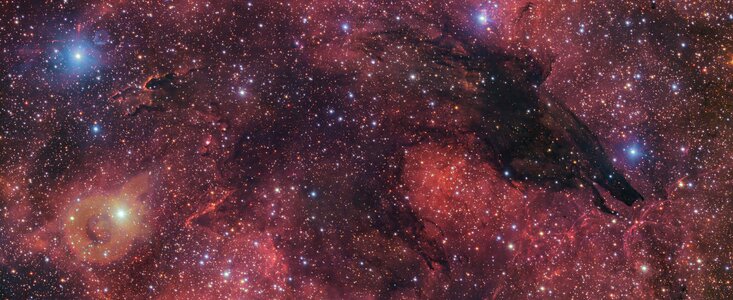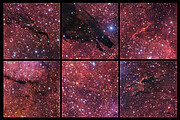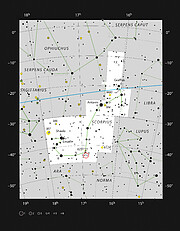Lehdistötiedote
ESO:n uusi kuva esittelee taivaan pimeän suden
31. lokakuuta 2024
Euroopan eteläinen observatorio (ESO) esittelee Halloweenin kunniaksi tämän aavemaisen kuvan pimeästä sumusta, joka saa aikaan illuusion suden siluetista värikästä kosmista taustaa vasten. Sen lempinimi on osuvasti "Pimeä Susi sumu eng. Dark Wolf Nebula", ja koostuu 283 miljoonan pikselin kuvasta, joka on otettu VLT Survey Telescope, eli VST-teleskoopilla ESO:n Paranalin observatoriossa Chilessä.
Pimeän Suden sumu sijaitsee Skorpionin tähdistössä Linnunradan keskustan lähellä noin 5300 valovuoden päässä Maasta. Tämä kuva kattaa taivaalla neljän täyden Kuun kokoisen alueen, mutta se on itse asiassa osa vielä suurempaa sumua nimeltä Gum 55. Jos katsot tarkkaan, niin huomaat, että susi voisi olla jopa ihmissusi, jonka kädet ovat valmiina tarttumaan pahaa-aavistamattomiin sivullisiin...
Jos ajattelit, että pimeys tarkoittaa tyhjyyttä, niin mieti uudelleen. Pimeät tähtisumut ovat kylmiä kosmisen pölyn pilviä, jotka ovat niin tiheitä, että ne peittävät niiden takana olevien tähtien ja muiden kohteiden valon taakseen. Nimensä mukaisesti ne eivät säteile näkyvää valoa, toisin kuin muut tähtisumut. Niissä olevat pölyhiukkaset absorboivat näkyvää valoa ja päästävät läpi valoa pidemmillä aallonpituuksilla, kuten infrapunavalon alueella. Tähtitieteilijät tutkivat näitä jäätyneen pölyn pilviä, koska niissä syntyy usein uusia tähtiä.
Aavemaisen suden jäljittäminen on tietenkin mahdollista vain siksi, että se erottuu kirkasta taustaa vasten. Kuvassa näkyy upeasti, miten tumma susi nousee esille sen takana olevista hehkuvista tähtiä muodostavista pilvistä. Värikkäät pilvet koostuvat pääasiassa vetykaasusta, ja ne hehkuvat punertavaa valoa, joita niiden sisällä olevien vastasyntyneiden tähtien voimakas UV-säteily kiihdyttää.
Jotkin tummat tähtisumut, kuten Hiilisäkkisumu, on mahdollista nähdä paljain silmin. Niillä on tärkeä rooli siinä, miten intiaanit tulkitsivat tähtitaivaan kohteita [1], mutta tämä sumu ei kuulunut niihin. Kuva on koostettu VLT Survey Telescope -kaukoputkella otetuista kuvista. Kaukoputken omistaa Italian kansallinen astrofysiikan instituutti (INAF), ja ESO operoi sitä Paranalin observatoriolla Chilen Atacaman autiomaassa. Teleskooppi on varustettu erityisesti siihen suunnitellulla kameralla, jonka avulla eteläistä tähtitaivasta kartoitetaan näkyvän valon alueella.
Kuva on koostettu eri aikoina otetuista kuvista, joissa on käytetty eri väristä valoa läpi päästäviä suotimia. Kaikki kuvat on otettu osana VST Photometric Hα Survey of the Southern Galactic Plane and Bulge (VPHAS+) taivaankartoitusta, jossa on tutkittu Linnunratamme noin 500 miljoonaa kohdetta. Tällaiset tutkimukset auttavat tutkijoita ymmärtämään paremmin kotigalaksimme tähtien elinkaarta. Kaikki tiedot ovat julkisesti saatavilla ESO:n tiedeportaalista. Voit itse tutkia tätä tietojen aarreaittaa. Kuka tietää, mitä muita aavemaisia muotoja voitkaan vielä löytää?
Lisähuomiot
[1] Eteläisen Keski-Chilen Mapuche-kansa kutsuu Hiilisäkkisumua nimellä "pozoko" (vesikaivo), ja inkat kutsuivat sitä nimellä "yutu" (peltopyyn kaltainen lintu).
Lisätietoa
Euroopan eteläinen observatorio (ESO) tekee maailmankaikkeuden salaisuuksien tutkimisen mahdolliseksi kaikille tutkijoille ympäri maailman. Suunnittelemme, rakennamme ja operoimme huippuluokan maanpäälisiä observatorioita, joita tähtitieteilijät käyttävät jännittävien tutkimusongelmien ratkaisemiseen ja populääritähtitieteen edistämiseen. Me edistämme myös kansainvälistä yhteistyötä tähtitieteen alalla. ESO perustettiin hallitustenväliseksi järjestöksi vuonna 1962 ja nykyään ESO:ssa on mukana 16 jäsenvaltiota (Itävalta, Belgia, Tšekki, Tanska, Ranska, Suomi, Saksa, Irlanti, Italia, Alankomaat, Puola, Portugali, Espanja, Ruotsi, Sveitsi ja Yhdistynyt kuningaskunta) yhdessä Chilen isäntävaltion kanssa ja Australian kanssa strategisena kumppanina. ESO:n pääkonttori ja sen vierailijakeskus ja planetaario, ESO Supernova, sijaitsevat lähellä Müncheniä Saksassa. Chilen Atacaman aavikko on upea paikka, jossa on ainutlaatuiset olosuhteet tähtitaivaan tarkkailuun. Se on kaukoputkiemme sijoituspaikka. ESO:lla on kolme havaintopaikkaa: La Silla, Paranal ja Chajnantor. Paranalissa ESO operoi Very Large Telescope (VLT) kaukoputkea ja siihen liittyvää Very Large Telescope Interferometria sekä paikalla sijaitsevia taivaankartoitusteleskooppeja: infrapuna-alueella toimivaa VISTAa ja näkyvän valon alueella toimivaa VLT Survey Teleskooppia. Paranalissa ESO isännöi ja operoi myös Cherenkov Telescope Array South havaintolaitetta, joka on maailman suurin ja herkin gamma-alueella havaitseva observatorio. ESO operoi yhdessä kansainvälisten kumppaneiden kanssa APEX- ja ALMA-observatriota Chajnantorilla, jotka ovat kaksi millimetri- ja alimillimetrin alueella toimivaa havaintolaitetta. Rakennamme parhaillaan Paranalin lähelle Cerro Armazonesille "maailman suurinta silmää taivaalle”, ESO:n Erittäin suurta kaukoputkea (Extremely Large Telescope, ELT). Santiagossa, Chilessä sijaitsevista toimipisteistämme tuemme toimintaamme Chilessä ja olemme yhteydessä chileläisiin yhteistyökumppaneihin ja yhteiskuntaan.
Linkit
- Paranalin taivaankartoitusteleskooppien kuvia VST mukaanlukien
- Median edustaja: Tilaa uutiskirje saadaksesi julkaisusulun alaiset uutiset omalla kielelläsi
- Tutkija, onko sinulla kerrtottavaa? Pitchaa oma tutkimuksesi!
Yhteystiedot
Juan Carlos Muñoz Mateos
ESO Media Officer
Garching bei München, Germany
Puh.: +49 89 3200 6176
Sähköposti: jmunoz@eso.org
Bárbara Ferreira
ESO Media Manager
Garching bei München, Germany
Puh.: +49 89 3200 6670
Matkapuhelin: +49 151 241 664 00
Sähköposti: press@eso.org
Pasi Nurmi (Lehdistön yhteyshenkilö Suomi)
ESO Science Outreach Network
ja University of Turku
Turku, Finland
Puh.: +358 29 4504 358
Sähköposti: eson-finland@eso.org
Tiedotteesta
| Tiedote nr.: | eso2416fi |
| Nimi: | Dark Wolf Nebula |
| Tyyppi: | Milky Way : Nebula : Type : Star Formation |
| Facility: | VLT Survey Telescope |
Our use of Cookies
We use cookies that are essential for accessing our websites and using our services. We also use cookies to analyse, measure and improve our websites’ performance, to enable content sharing via social media and to display media content hosted on third-party platforms.
ESO Cookies Policy
The European Organisation for Astronomical Research in the Southern Hemisphere (ESO) is the pre-eminent intergovernmental science and technology organisation in astronomy. It carries out an ambitious programme focused on the design, construction and operation of powerful ground-based observing facilities for astronomy.
This Cookies Policy is intended to provide clarity by outlining the cookies used on the ESO public websites, their functions, the options you have for controlling them, and the ways you can contact us for additional details.
What are cookies?
Cookies are small pieces of data stored on your device by websites you visit. They serve various purposes, such as remembering login credentials and preferences and enhance your browsing experience.
Categories of cookies we use
Essential cookies (always active): These cookies are strictly necessary for the proper functioning of our website. Without these cookies, the website cannot operate correctly, and certain services, such as logging in or accessing secure areas, may not be available; because they are essential for the website’s operation, they cannot be disabled.
Functional Cookies: These cookies enhance your browsing experience by enabling additional features and personalization, such as remembering your preferences and settings. While not strictly necessary for the website to function, they improve usability and convenience; these cookies are only placed if you provide your consent.
Analytics cookies: These cookies collect information about how visitors interact with our website, such as which pages are visited most often and how users navigate the site. This data helps us improve website performance, optimize content, and enhance the user experience; these cookies are only placed if you provide your consent. We use the following analytics cookies.
Matomo Cookies:
This website uses Matomo (formerly Piwik), an open source software which enables the statistical analysis of website visits. Matomo uses cookies (text files) which are saved on your computer and which allow us to analyze how you use our website. The website user information generated by the cookies will only be saved on the servers of our IT Department. We use this information to analyze www.eso.org visits and to prepare reports on website activities. These data will not be disclosed to third parties.
On behalf of ESO, Matomo will use this information for the purpose of evaluating your use of the website, compiling reports on website activity and providing other services relating to website activity and internet usage.
Matomo cookies settings:
Additional Third-party cookies on ESO websites: some of our pages display content from external providers, e.g. YouTube.
Such third-party services are outside of ESO control and may, at any time, change their terms of service, use of cookies, etc.
YouTube: Some videos on the ESO website are embedded from ESO’s official YouTube channel. We have enabled YouTube’s privacy-enhanced mode, meaning that no cookies are set unless the user actively clicks on the video to play it. Additionally, in this mode, YouTube does not store any personally identifiable cookie data for embedded video playbacks. For more details, please refer to YouTube’s embedding videos information page.
Cookies can also be classified based on the following elements.
Regarding the domain, there are:
- First-party cookies, set by the website you are currently visiting. They are stored by the same domain that you are browsing and are used to enhance your experience on that site;
- Third-party cookies, set by a domain other than the one you are currently visiting.
As for their duration, cookies can be:
- Browser-session cookies, which are deleted when the user closes the browser;
- Stored cookies, which stay on the user's device for a predetermined period of time.
How to manage cookies
Cookie settings: You can modify your cookie choices for the ESO webpages at any time by clicking on the link Cookie settings at the bottom of any page.
In your browser: If you wish to delete cookies or instruct your browser to delete or block cookies by default, please visit the help pages of your browser:
Please be aware that if you delete or decline cookies, certain functionalities of our website may be not be available and your browsing experience may be affected.
You can set most browsers to prevent any cookies being placed on your device, but you may then have to manually adjust some preferences every time you visit a site/page. And some services and functionalities may not work properly at all (e.g. profile logging-in, shop check out).
Updates to the ESO Cookies Policy
The ESO Cookies Policy may be subject to future updates, which will be made available on this page.
Additional information
For any queries related to cookies, please contact: pdprATesoDOTorg.
As ESO public webpages are managed by our Department of Communication, your questions will be dealt with the support of the said Department.




